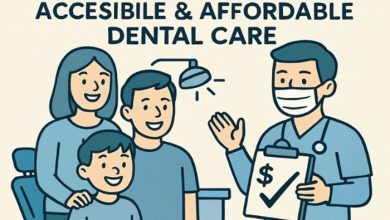
Eating disorders are more than just a struggle with food—they are serious mental health conditions that can have devastating effects on both the mind and body. Whether it’s anorexia nervosa, bulimia nervosa, or binge eating disorder, these conditions affect millions of people worldwide. While they may start with concerns about weight or body image, they often spiral into deep-rooted psychological and physical consequences. In some cases, treatments such as testosterone therapy may be explored to address hormonal imbalances that can accompany these disorders.
The Mental Health Impact of Eating Disorders
1. Heightened Anxiety and Depression
One of the most significant effects of eating disorders is their impact on mental well-being. Many individuals battling these disorders experience intense anxiety and depression. The constant preoccupation with food, weight, and self-worth can lead to feelings of hopelessness and sadness. Studies show that those with anorexia and bulimia are at a much higher risk of developing clinical depression and generalized anxiety disorder.
2. Distorted Body Image and Low Self-Esteem
People with eating disorders often struggle with body dysmorphia, a condition where they have a distorted perception of their own body. Even when they are dangerously underweight, they may still perceive themselves as overweight. This negative self-image reinforces unhealthy eating behaviors, making recovery challenging.
3. Social Isolation and Relationship Struggles
Eating disorders can make social interactions stressful. Many sufferers withdraw from family and friends due to fear of being judged or because they are trying to hide their eating habits. This social isolation can lead to loneliness and even suicidal thoughts, especially in severe cases.
4. Cognitive Impairment and Concentration Issues
When the body is starved of essential nutrients, it impacts brain function. Many people with eating disorders struggle with brain fog, difficulty concentrating, and memory problems. This makes everyday tasks, work, and academic performance more difficult.
5. Increased Risk of Substance Abuse
Studies show a strong link between eating disorders and substance abuse. People struggling with eating disorders may turn to alcohol or drugs to cope with stress, anxiety, or emotional pain. This dual struggle makes treatment more complex and increases the risk of long-term mental health issues.
The Physical Consequences of Eating Disorders
1. Severe Malnutrition and Organ Damage
Prolonged restriction of food or frequent purging can deprive the body of essential nutrients, leading to malnutrition. In severe cases, this can cause organ failure, particularly in the heart, kidneys, and liver. Anorexia nervosa, for example, can result in a dangerously slow heart rate, low blood pressure, and even sudden cardiac arrest.
2. Gastrointestinal Problems
Bulimia and binge eating disorder often lead to digestive issues, including acid reflux, chronic constipation, and bloating. Frequent purging damages the esophagus and can cause severe stomach ulcers. Laxative abuse, which is common in those trying to lose weight rapidly, can result in long-term bowel dysfunction.
3. Hormonal Imbalance and Fertility Issues
Eating disorders disrupt the body’s hormonal balance, leading to irregular or missing periods (amenorrhea) in women. This can cause infertility and osteoporosis, increasing the risk of fractures due to weak bones. Men are not exempt either—low testosterone levels can result from severe weight loss. A testosterone biomarker program can ensure men have the correct levels of testosterone at the right age. For women experiencing hormonal imbalances, using products like vaginal probiotics amazon may help restore vaginal health and support overall well-being during recovery.
4. Weakened Immune System
A diet lacking essential vitamins and minerals weakens the immune system, making individuals more prone to infections and slow wound healing. Chronic malnutrition can leave the body unable to fight off common illnesses effectively.
The Road to Recovery
1. Seeking Professional Help
The first step to recovery is acknowledging the problem and seeking professional treatment. Therapy, especially cognitive-behavioral therapy (CBT), has been proven effective in addressing the underlying psychological triggers of eating disorders. Support from a nutritionist, psychiatrist, or primary care doctor is also crucial.
Seeking professional help is essential for recovery. Treatment options include therapy, nutritional counseling, and medical support. Cognitive Behavioral Therapy (CBT) is often recommended to help individuals change negative thought patterns related to food and body image. Support groups and family therapy can also play a significant role in recovery. For more information on understanding and addressing eating disorders, you can read more.
2. Building a Support System
Having a strong support network—whether it’s family, friends, or support groups—can make a huge difference in recovery. Open conversations about struggles, fears, and victories help break the cycle of isolation and shame.
3. Developing a Healthy Relationship with Food
Recovering from an eating disorder means rebuilding trust in food and the body. Meal plans created with a dietitian can help establish balanced eating habits and restore nutritional health. Mindful eating practices can also aid in reconnecting with hunger cues and reducing binge-eating episodes.
4. Practicing Self-Compassion
Many individuals with eating disorders struggle with perfectionism and self-criticism. Learning to be kind to oneself, celebrating small progress, and understanding that setbacks are part of the journey is key to long-term recovery.
Eating disorders are complex but treatable conditions. Seeking professional help is essential for recovery. Treatment options include therapy, nutritional counseling, and medical support. Cognitive Behavioral Therapy (CBT) is often recommended to help individuals change negative thought patterns related to food and body image. Support groups and family therapy can also play a significant role in recovery.
Final Thoughts: Healing Is Possible
Eating disorders take a serious toll on mental and physical health, but with the right help and support, recovery is absolutely possible. If you or someone you know is struggling with an eating disorder, reaching out for help is the most courageous step. Healing is not just about food—it’s about self-acceptance, mental well-being, and a better quality of life.
If you need support, consider speaking to a healthcare professional or reaching out to organizations that specialize in eating disorder recovery. Your journey to healing starts today.




